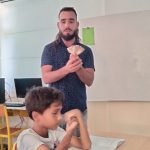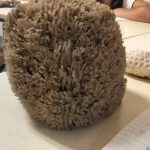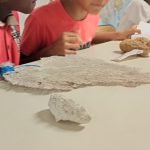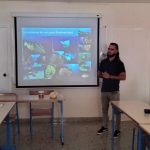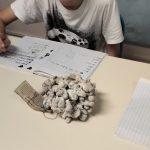Go Green
Premièrement, nous avons étudié une séquence sur “La préservation de la vie maritime”, concernant les animaux de la mer et la pollution de cet écosystème, en anglais (avec les CM1-CM2) en lien avec le cours de français (CM2).
Ensuite, visant à sensibiliser les élèves à la protection de la vie maritime, nous avons accueilli le plongeur spécialiste du Centre de Recherche Marine (CIM) Rayan Betancourt, qui nous a expliqué les conséquences du blanchiment des coraux.
Very interesting!
Voici l’article en anglais écrit par les élèves après la visite du plongeur.
GO GREEN !
First, we read the story in English Pete the Cat Scuba Cat together with the 4th graders (CM1). This story talks about Pete going scuba diving and seeing many sea animals.
Then, on November 21st, 2023, a professional scuba diver, who works for the Sea Institute Research (CIM) visited our class (CM2) and explained why corals are dying and how to stop this phenomenon.
What are corals?
Corals are living creatures composed of “polyps.” These are tiny animals that live in many different corals and form colonies. Anemones and jellyfish are also associated with polyps.
How do corals get colored?
The corals absorb different kinds of algae that provide them with colors and food. Simultaneously, these algae live in the corals to be in a protected environment and to perform the photosynthesis (for more explanation, search on the dictionary).
Hint: If you go scuba diving at night, you may see the polyps generate some light.
Why do corals become white?
Corals whiten and start dying due to climate change, low tides, too much sunlight exposure, and pollution. If the temperature is too hot, the corals will die. If plastic objects cover the sunlight, the corals will die.
How can we protect corals?
- Use electric cars, instead of fuel cars, to prevent climate change.
- Turn off the tap when you are brushing your teeth to save drinking water.
- Don’t throw trash into the sea.
Felix and Renzo
5th graders (CM2)




